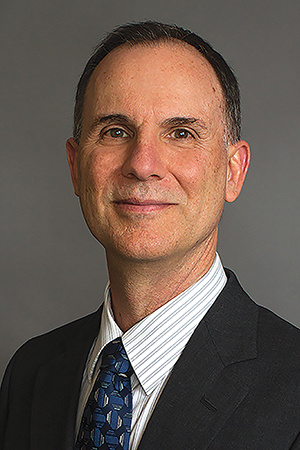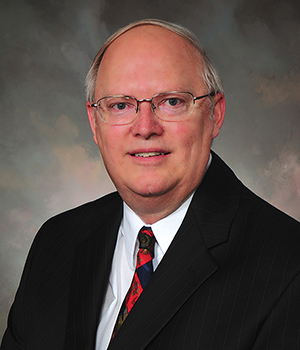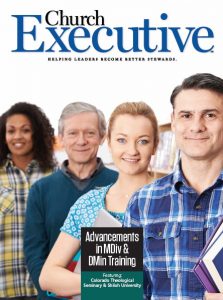
How seminaries and universities are making graduate studies more accessible for busy full-time church leaders

President
Shiloh University
In general, have full-time church leaders shown increased interest in MDiv and DMin training in recent years?
Christopher Reeves: Yes — church leaders today face more challenging responsibilities in leading their churches. Also, research shows that employers and students now regard the master’s degree as the new bachelor’s degree. So, while many church leaders have completed undergraduate Bible college degrees or received informal discipleship training, there’s a growing need and desire for graduate education.
Accordingly, access to these types of programs has also grown. Research and our own experience here at Shiloh University have shown that the Master of Divinity continues to be the most popular seminary degree for church leaders, followed by the Master of Arts and the Doctor of Ministry.
Gary G. Tryzbiak: We have certainly seen a rise in full-time church leadership interest in our Master of Divinity (MDiv) and Doctor of Ministry (DMin) programs here at Colorado Theological Seminary (CTS). It’s my belief that pastors and lay leaders recognize the need to expand their knowledge in Bible basics, as well as advanced theological concepts which are needed to combat the many misunderstandings about Christianity in today’s world.
“Also, research shows that employers and students now regard the master’s degree as the new bachelor’s degree. So, while many church leaders have completed undergraduate Bible college degrees or received informal discipleship training, there’s a growing need and desire for graduate education.”
— Christopher Reeves, MEd
The rise of Anti-Semitism, Radical Islam, various hate groups, and the obvious Anti-Christian phenomenon around the world has placed a huge burden on our full-time pastors to more effectively preach the Good News to a dwindling list of churchgoers.
Of course, there’s the need to reach the younger generation for what I think are obvious reasons.

President, Co-founder
Colorado Theological Seminary
With a deeper understanding comes the increased ability to articulate The Word in pastoral and community settings. Exposure to the content in our MDiv and DMin programs cultivates that inner confidence to face the continuing and growing assault on our Biblical principles, and I believe our church leaders are well aware they need to bolster any deficiencies that might have. Pardon the phrasing, but “shooting from the hip” is longer working. Listeners of The Word need to be convinced.
How have your MDiv offerings adapted to meet the needs of full-time church leaders?
Tryzbiak: In order to meet the needs of full-time church leaders, we have incorporated several key features that have enhanced the attractiveness of our Master of Divinity program.
First and foremost, we allow the student to progress at their own pace. Since we cater to the mature Christian — most of whom are working full-time and more than likely raising a family — we understand how difficult it is to balance life’s issues. This reduces the stress of deadlines and the likelihood of dropping their program out of frustration.
Second, we included a number of online Christian Counseling courses. These are Basic Christian Counseling, Creation Therapy and Christian Counseling: The Integrating Temperament and Psychology.
Third, we went to an audio format for the remaining 27 courses in the areas of Bible, Ministry, Theology and Leadership.
Reeves: From the beginning, we designed our MDiv program to meet the needs of full-time church leaders. It’s not practical for many church leaders to pursue their educational goals by leaving their place of ministry, or traveling to distant campus locations. Our 100% online programs intentionally serve full-time and bi-vocational church leaders by allowing our students to remain in their ministry settings. Our 15-week online courses were designed with flexibility, in a weekly structure, to assist busy individuals in planning their study time in a way that best fits their schedules.
Over the past 10 years, we have improved the delivery of our course content. Incorporating stakeholder suggestions with technological advancements in hardware, software and internet availability, our students continue to reap the rewards of these advancements in tangible ways.
We have also received testimonials from church leaders who have affirmed the value of studying while remaining engaged in the practice of ministry. These leaders have grown from their interaction with the course content, the interaction with their professors, and their interaction with other students. Their studies find ready application in their lives as church leaders.
Similarly, regarding your DMin offerings — how have those adapted to better suit full-time church leaders’ schedules?
Reeves: Full-time DMin programs are typically offered through intensive on-ground seminars. We offer a 100% online, 15-week program that maintains the strength of the cohort interaction with the benefits of distance education. There are no travel or residency requirements.
Our DMin program is not yet a full decade old; so, much of the evolution and adaptation took place during its development. Studies show only 50% of students who complete doctoral courses go on to complete their research project. We consulted recent graduates of successful DMin programs and gleaned important foundational information for our program to reduce attrition and promote success.
“Exposure to the content in our MDiv and DMin programs cultivates that inner confidence to face the continuing and growing assault on our Biblical principles, and I believe our church leaders are well aware they need to bolster any deficiencies that might have. Pardon the phrasing, but “shooting from the hip” is longer working. Listeners of The Word need to be convinced.”
— Gary G. Tryzbiak, Th.D.
Our DMin program structure and caring faculty support participants from start through completion. We have designed our program with two research clinics —at the

start and at the end — to assist participants in the process of applying their research and studies to their selected professional ministry project.
The online project component in year 3 keeps the participants connected to a cohort that provides encouragement and support for the completion of their project.
Tryzbiak: Similar to the MDiv program, we have gone to the “progress-at-your-own-pace” model.
Additionally, for some years now, we have taken the DMin program online with our Canvas Learning Management System by Instructure. Students and faculty alike are extremely happy with this enhancement. Course material is sorted in manageable segments, and the student grade book is easily accessible. Therefore, pausing progress and restarting within the course is quite easy and a stress reliever. Uploading documentation is as easy, as well.
Internal communication within Canvas between faculty and student is also very simple to use, which keeps everyone in touch.
In accommodating full-time church leaders interested in obtaining an MDiv or DMin degree, how important is the online component, and why?
Tryzbiak: For CTS, the online component is very important and crucial for a number of reasons. The main reason is that it gives our students flexibility in managing their study time and for a more rapid response for their answers and feedback.
Second, it allows CTS to reach the global Christian population that has a desire to earn their advanced degree from an affordable, accessible and credible organization.
An additional advantage of online service delivery is that errors, enhancements and omissions can easily be corrected. This also includes any other modifications or maintenance that might be necessary within our platforms.
Reeves: Online education addresses many church leaders’ limited time and financial resources by allowing time flexibility, providing quality engagement, and providing affordable costs. Online education allows the church leader to stay engaged in his or her ministry while pursuing their graduate studies.
Online learning does not mean studying in isolation; in our learning communities, members feel connected to (and assist) each other in their efforts to learn. Students learn best in community.
Online courses with asynchronous interaction allow the busy church leader to engage with other students and also to stay engaged with their families and ministry setting. Clearly defined expectations guide the students through manageable content segments, and encourage thoughtful interaction, reflection and application.
What would you say to a pastor who still thinks an MDiv or DMin degree is “out of reach”?
Reeves: The barriers of affordability, travel and time flexibility are effectively mitigated through online learning. Many of our students originally thought that seminary education was beyond their reach, but they have succeeded in managing their time and in completing their degree programs.
An additional concern is the uncertainty about succeeding in graduate studies. We address this concern by providing support with clear expectations, student advisors, writing center assistance, and other practical resources. Students can begin by taking one course at a time to develop their study skills, learning how to successfully incorporate studying into their lives.
Tryzbiak: The entire purpose of our MDiv and DMin programs are to avail them to all pastors who are contemplating a credible degree which is affordable and accessible. Our programs are designed as to not “break the bank.” Indeed, most of our students will have paid for their education by the time they graduate. Although most of our students pay by the course, we do offer payment plans with no credit check.
Additionally, we offer a 10-percent Student Tuition Scholarship to active military and veterans, as well as students paying for their program upfront.
CTS has also affiliated with Christianbook.com so that students may easily obtain needed outside reading material that might be required for any particular course. These features — as well as the progress-at-your-own-pace formula — allows a pastor to very easily incorporate his or her education into their busy life style.
— Reporting by RaeAnn Slaybaugh
Chris Reeves, MEd, has been involved in church leadership for more than 30 years. In 2006, he joined the team of church leaders and educators at Shiloh University. Since that time, he has led its faculty and staff in establishing quality, affordable online educational opportunities for church leaders in North America and other countries.
Gary G. Tryzbiak, Th.D., received a Bachelor of Business Administration (BBA) — College of Emporia, KS 1973; an MA in Computer Resource and Information Management — Webster University St. Louis, MO 1993; and a Doctor of Theology in Ministry Management – Florida Theological Seminary, Orlando, FL 1997. In 1999, he became president and co-founder of Colorado Theological Seminary.


